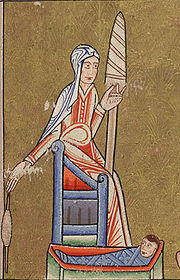
I've been dipping into this massive tome by Norman Davies, Europe: A History, that a family friend gave us before we left California. This passage jumped out at me this morning:
Imagining the Middle Ages is, indeed, the problem. Historians have to stress not just what the medieval scene contained but also what it lacked. In its physical surroundings, it lacked many of the sights, sounds, and smells that have since become commonplace. There were no factory chimneys, no background traffic noise, no artificial pollutants or deodorants. Tiny isolated settlements existed in an overpowering wilderness of forest and heath, in a stillness where a church bell or the lowing of a cow could carry for miles, amidst a collection of natural but pungent whiffs from the midden and the wood fire. People's perception of those surroundings lacked any strong sense of discrimination between what later times would call the natural and the supernatural, between fact and fuction, between the present and the past. Men and women had few means of verifying the messages of their senses, so all sorts of sensations were given similar credence. Angels, devils, and sprites were as real as one's neighbours. The heroes of yesterday, or of the Bible, were just as present (or as distant) as the kings and queens of one's own country. (432)
When I try to envision this particular neighborhood of the past, it's that isolation that I find most fascinating. It's true that sometimes we tend to overdo it in our conception of those times--genetic analysis, along with archeaology, makes it very clear that people have been moving and mixing for time immemorial--but for an ordinary person, especially if that person was female, life might easily be lived in an area no bigger than a day's travel. Beyond that would all be rumors, fireside stories, and hearsay.
Erika Mailman's short novel The Witch's Trinity does a wonderful job of capturing this time and place for me. I read this book years ago, but its atmosphere has remained with me so well that my copy made it to Stockholm, and I will have to reread it soon. I remember most being both entranced and frustrated by the fact that the main character, an elderly woman who knows full well she's a burden to her son and daughter-in-law, never can quite see beyond her own village and the forest that surrounds it. The only other book I've read that achieves something similar is Cynthia Voigt's Jackaroo. This one I read last in seventh grade, but images have stuck with me, clearly, for years. First among them is the main character's elderly grandfather, who, at 50, is experiencing that kind of existential loneliness that comes with outliving all of your peers.
The next paragraph in this passage from Europe speaks to travel and time:
The medieval awareness of time and space was radically different from our own. Time was measured by the irregular motions of day and night, of the seasons, of sowing and reaping. Fixed hours and calendars were in the sacred preserve of the Church. Men travelled so slowly that they possessed no means of testing conventional geographical wisdom. Jerusalen lay at the centre of the three continents--Asia, Africa, and Europe, allocated respectively to the sons of Noah: Shem, Ham, and Japheth. Beyond the continents lay the encompassing ocean, and beyond the ocean the line where heaven and earth merged imperceptibly into one. (432)
I've been thinking quite a bit about those "irregular motions of day and night," given that we are losing close to ten minutes of daylight each day over here, but that's for an upcoming post. I've also been listening to archived podcasts of In Our Time with Melvin Bragg from BBC 4 (everyone and their mother takes a summer break in Europe, so there aren't any new ones for another three weeks more), most recently "The Calendar." At one point Kristen Lippencott points out that we in the modern western world tend to take our calendar extremely seriously--though she doesn't say it, I'd argue that as a society we take it more seriously than our religion--to the point where we tend to forget that it's a construct. A construct based on natural observations, certainly, but a construct nonetheless, some parts more than others. Seven days in a week? What for?
Once when I was in China there was a holiday that fell in the middle of the week and screwed things up so much that the government intervened. Because we'd lost a Wednesday and a Thursday (or something like that--I don't remember exactly), we'd get the days off, and then we'd just pretend that the following Sunday and Monday were those missing days. We'd go about our daily schedule as though it were Wednesday or Thursday, even though the calendar said that it wasn't. That was the first time--and I was 23 years old--that it had ever occurred to me that you could do that. And it felt so, so wrong. And in light of this memory, while we obviously see beyond the borders of our towns these days in so many, many different ways, it makes me wonder what history books (or whatever they have in the future) will have to say about cultural conceptions that we hold so self-evident that we don't even realize that they might be only that--just interpretations of what we see, and not the things themselves.